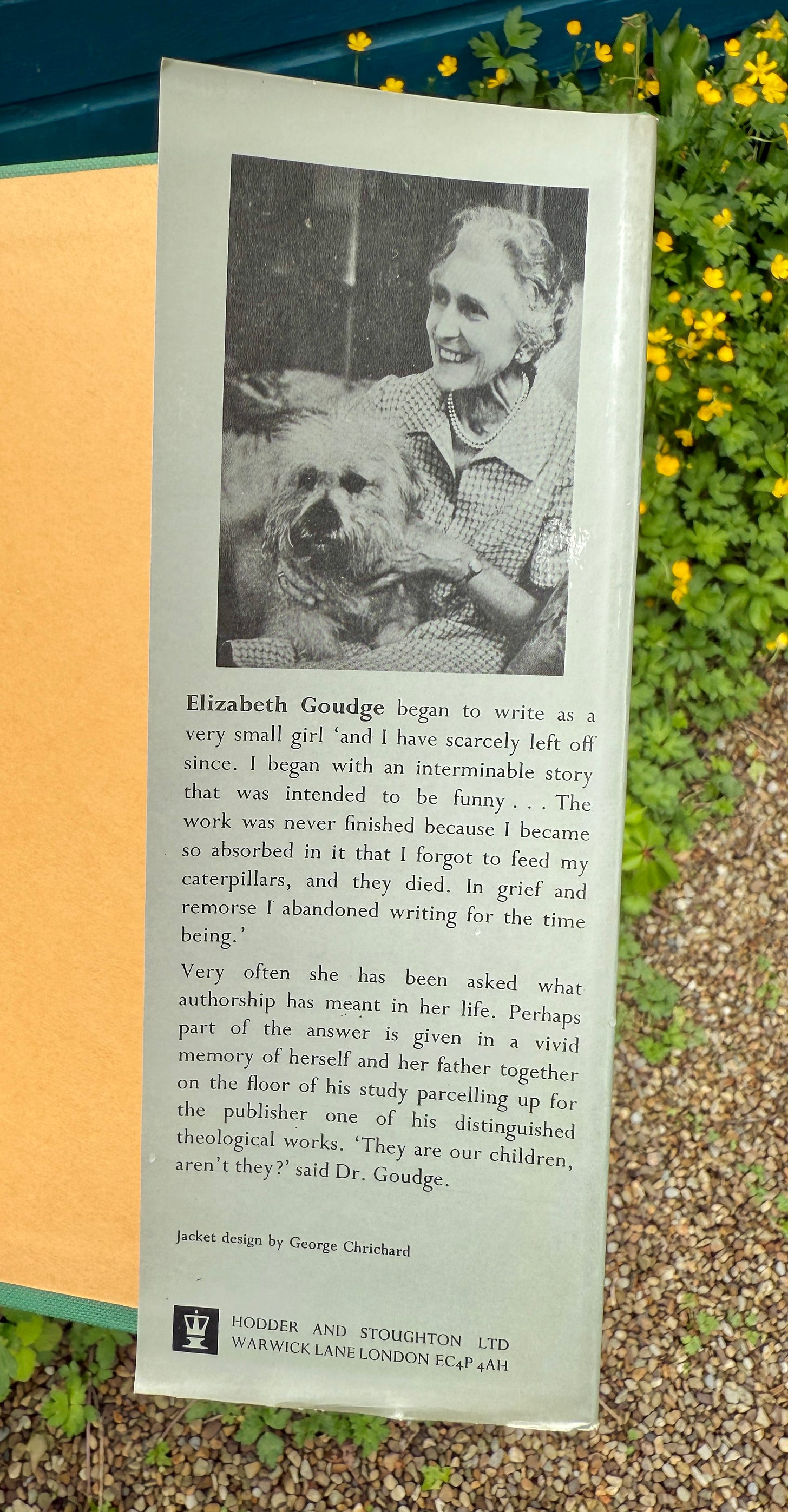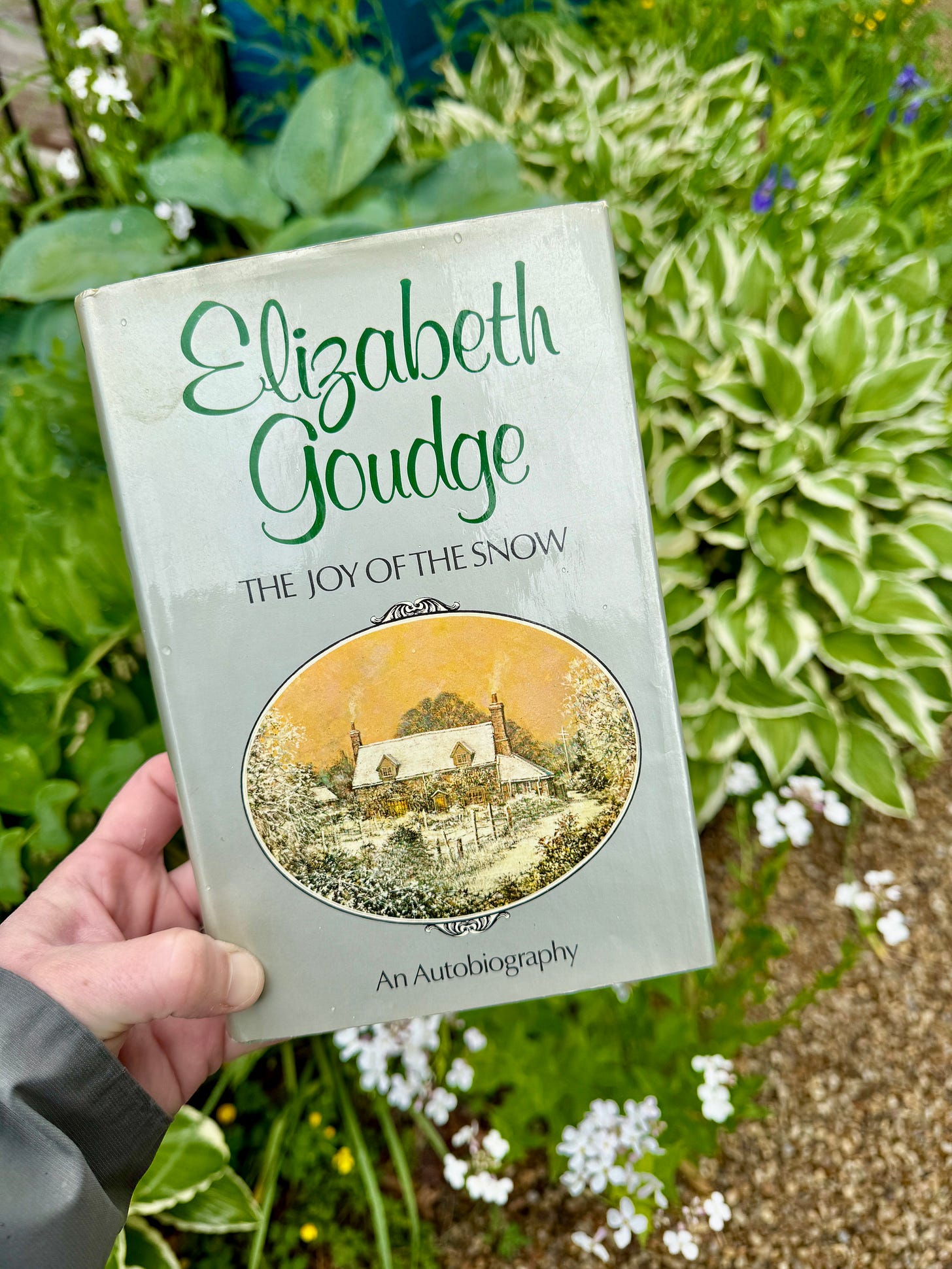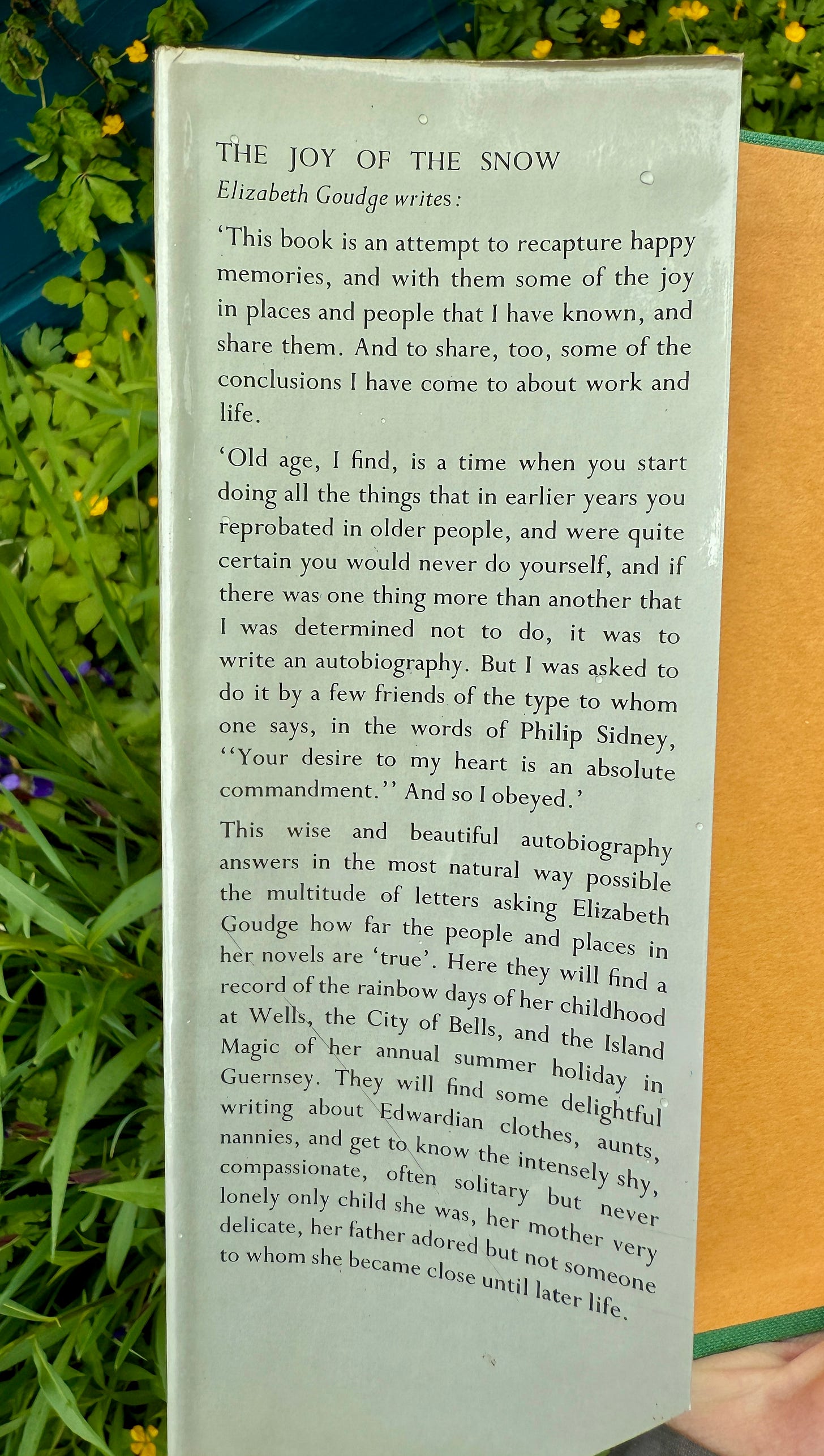“It was not myself as a child but the daughter of a friend of mine who gave me the title for this book.
Her mother, accompanied by the dog Coach, had ploughed her way through a deep fall of snow to fetch her youngest home from nursery school. The hard going had been a weariness, the cold a misery to the flesh. Ploughing back again, her youngest attached, a small voice sang out beside her, "Look, Mummy! Look at Coach and the joy of the snow!" Coach was leaping and rolling in the snow, his eyes like stars, his tail a banner. The little girl's eyes were as bright as his, her face pink inside her hood. She glowed like a flame. Coach glowed. The mother for a few moments looked at the snow through their eyes and the earth had not smutched it.”
🌿 Elizabeth Goudge, The Joy of the Snow
Goudge’s accidental autobiography
For such a shy person, fame must have been a very trying thing for Elizabeth Goudge at times. In The Scent of Water we see a small picture of herself in the reclusive character Jean Anderson, and one imagines that Jean would have fainted at the idea of creating a book entirely about herself.
In order to get through it, Goudge seems to have tricked herself into writing an autobiography by telling herself that it was just another book like her others:
“…This book is hardly an autobiography, it is more an attempt to recapture happy memories and with them some of the joy in places and people that I have known, and to share them…”1
Thank goodness for her generosity and drive to preserve the precious British countryside, which gives us a wonderful peek “behind the curtain” of her life and work! Goudge begins her autobiography in the Wells of her childhood, makes a stop for her thoughts on storytelling, and then continues to follow her life travels across the south of England.
Dedication
"For Alan Walton and the other friends who wanted me to write this book"
🌿 Elizabeth Goudge, The Joy of the Snow
Christine Rawlins writes in Beyond the Snow that:
“Alan Hull Walton… insisted that for the sake of all her millions of readers worldwide, she must write her autobiography - she owed it to them:
[Alan said] ‘And she smiled that calm, delightful, wonderful smile which I've never seen on any other face, and said: Yes, I'll do it.’2
Goudge’s publisher wrote of her volume:
“This wise and beautiful autobiography answers in the most natural way possible the multitude of letters asking Elizabeth Goudge how far the people and places in her novels are 'true'. Here they will find a record of the rainbow days of her childhood at Wells, the City of Bells, and the Island Magic of her annual summer holiday in Guernsey. They will find some delightful writing about Edwardian clothes, aunts, nannies, and get to know the intensely shy, compassionate, often solitary but never lonely only child she was, her mother very delicate, her father adored but not someone to whom she became close until later life.”3
Join us today for an introduction to her autobiography, accompanied by photos of the 1974 UK edition…
“Old age, I find, is a time when you start doing all the things that in earlier years you reprobated in older people, and were quite certain you would never do yourself, and if there was one thing more than another that I was determined not to do it was to write an autobiography.
But the request that I should do so came from a few of those people to whom one can only say, in the words of Philip Sidney, "Your desire to my heart is an absolute commandment." And so I obeyed. Yet this book is hardly an autobiography, it is more an attempt to recapture happy memories and with them some of the joy in places and people that I have known, and to share them. And to share, too, some of the conclusions I have come to about work and life. Neither will be in the least exciting and so my hope for this book is that it will be a good bedside book, and keep nobody awake.”
🌿 Elizabeth Goudge, The Joy of the Snow

From her publisher:
“Elizabeth Goudge began to write as a very small girl 'and I have scarcely left off since. I began with an interminable story that was intended to be funny... The work was never finished because I became so absorbed in it that I forgot to feed my caterpillars, and they died. In grief and remorse I abandoned writing for the time being.'
Very often she has been asked what authorship has meant in her life. Perhaps part of the answer is given in a vivid memory of herself and her father together on the floor of his study parcelling up for the publisher one of his distinguished theological works. 'They are our children, aren't they?' said Dr. Goudge.”
A suggested reading schedule:
Week 1: chapters 1-4
Week 2: chapter 5-7
Week 3: chapters 8-10
Week 4: chapters 11-16
Join us for a live book chat later this month on TUESDAY, June 24th at 3pm!
(We usually meet Wednesdays, but I will be on the road to Chicago that day so we will meet the day before.)
Hope you can join us to this month! Have you read Gouge’s autobiography before? Love to hear!
Related post:
The Joy of the Snow, Elizabeth Goudge
Beyond the Snow, Christine Rawlins
The Joy of the Snow, Elizabeth Goudge, UK 1974 edition














Reading it for the first time; I've just read the very first bit, in which she recounts her earliest memory. I'm discovering all over again the wonderful combination of wisdom and elegance in her writing. In places she is rather mysterious; I don't know if it is because of reticence, or just that she is teasing the reader with a reference to things that will be described in depth later. I'm thinking of the passage where she says of her father "he was always so far ahead". She's just finished describing an episode in which he was literally ahead of her on a garden path, but here she's clearly using that metaphorically and I don't really know what she means.
This is a first-time read for me, and I'm loving it. I just read the part where she was made to give away her presents at Christmastime and immediately thought of Henrietta doing the same. Which book is that in? They all blend together in my mind, in a good way. :)